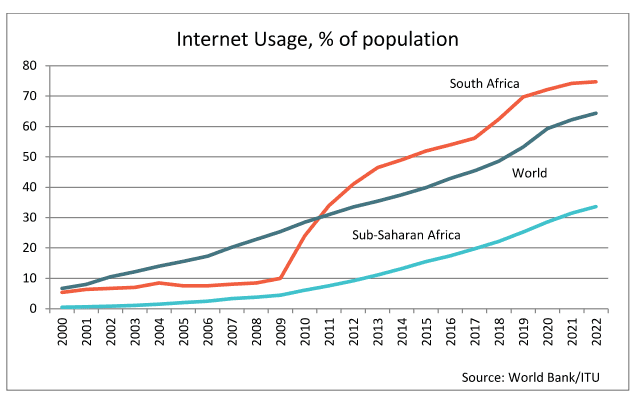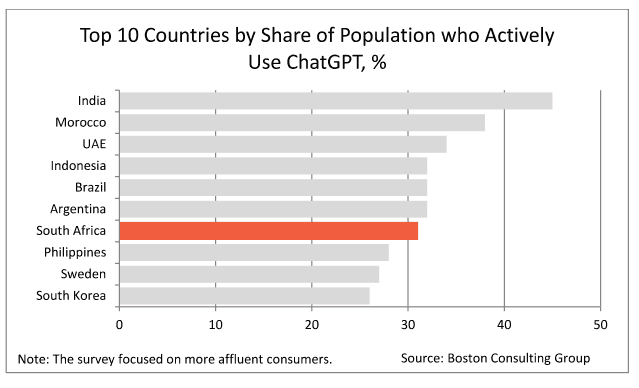The AI Revolution in South Africa: Navigating the Unstoppable Tech Wave
Tech trends in South Africa, like all over the world, are dominated by artificial intelligence (AI). As usual, initial reactions to new technology are often optimistic. The revolutionary augmented reality, (AR) for example, was expected to change the way that people interact with the digital world, but has so far failed to gain traction, largely due to privacy concerns and high prices. This resulted in its discontinuation by Google in 2023 and dramatic scaling down by Meta.
Technology deployment in South Africa
The continued rollout of 5G networks has led to the rapid evolution of technology, which has become an unstoppable wave disrupting all industries worldwide – from agriculture to smart infrastructure where smart devices optimise maintenance, and energy use with the internet of things (IoT) revolutionising the collection of real-time data, driving efficiency.
The rapid evolution of technology has become an unstoppable force reshaping all industries worldwide. Businesses must embrace and leverage this transformation to stay competitive. IoT is revolutionising operations through real-time data collection, automation and enhanced connectivity, driving efficiency and innovation at an unprecedented scale.
Those who proactively ride this wave will gain a significant competitive edge, while those who resist may find themselves obsolete in a hyper-connected world.

The Who Owns Whom report on tech trends in South Africa illustrates how the country is punching above its weight regarding internet usage, and continues to lead the way for sub-Saharan countries. The report points to internet usage as a driver of technology adoption. Internet usage has grown from 5.4% in 2000 to almost 75% in 2022.
How industries have adopted AI and the consequential impact on employment
Many companies have been working for years on developing AI, and achievements like machine learning continue, although they may not be visible to the wider public. The launch of ChatGPT as open software made the public aware of the vast progress made with AI, and its immense potential for all kinds of applications. It also reignited the old fear that technological advancements destroy jobs.
The Who Owns Whom report lists several industries where AI will cause major disruptions, although it remains general and vague as how this will happen.
AI has extended hardware and software capacities. This is evidenced in Google search engines that are not comparable to the search engines of 10 years ago.
Advances such as machine learning, AI and advanced robotics are transforming the workplace worldwide and South Africa’s workplace will be equally disrupted.
Whilst digitisation and automation have the potential to improve productivity and efficiency, the adoption of digital technologies can deliver improved outcomes for businesses and customers and as a result, create more jobs. However, this cannot be achieved without an intentional skills development programme that focuses on the new technologies. This can either turn the job creation tide or worsen the unemployment situation if not tackled strategically.
South Africa’s usage of AI and its implications
However, the impact of AI can also not be understated. South Africa’s usage is ranked high among more affluent users as illustrated in the graph.

Planned investment in technology by the magnificent seven (the seven large and dominant tech companies) alone for just 2025 will amount to US$320bn, which is almost as much as the entire GDP of South Africa. France is committing US$100bn to AI-related investments.
AI can create jobs, but these jobs will require new and more sophisticated skills. South Africa needs to act early and ramp up its education system to meet the demand for those types of skills.
Contact us to access WOW's quality research on African industries and business
Contact UsRelated Articles
BlogCountries Information and communicationSouth Africa
The Impact of streaming on music industry earnings in South Africa
Contents [hide] Historical evolution of the music industry From the revered gramophone, which was the first instrument capable of reproducing music and storing it on a flat disk, invented by...
BlogCountries Information and communicationSouth Africa
Telecommunications: a catalyst in African economic development
Contents [hide] The role of telecommunications in driving economic development Telecommunications serves as a backbone of modern economies and underpins various industries that are essential for economic activities, from financial...
BlogCountries Information and communicationSouth Africa
The rapid transformation of household internet access in South Africa
Contents [hide] History of internet access in South Africa As with most innovations, internet access was relatively expensive when it was first introduced. Sources of information available were much more...





